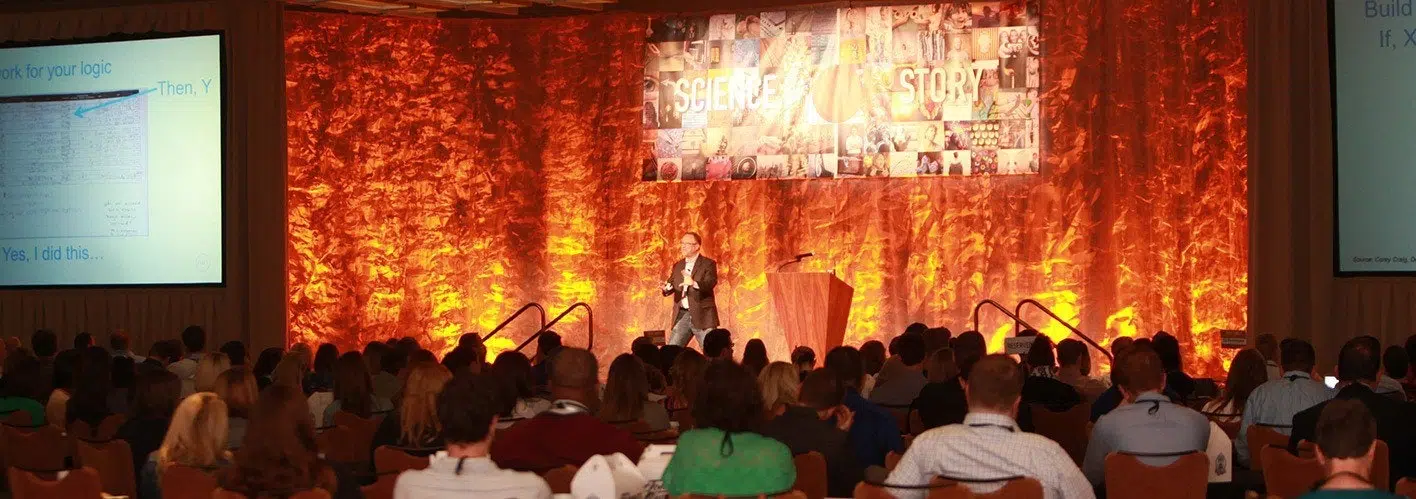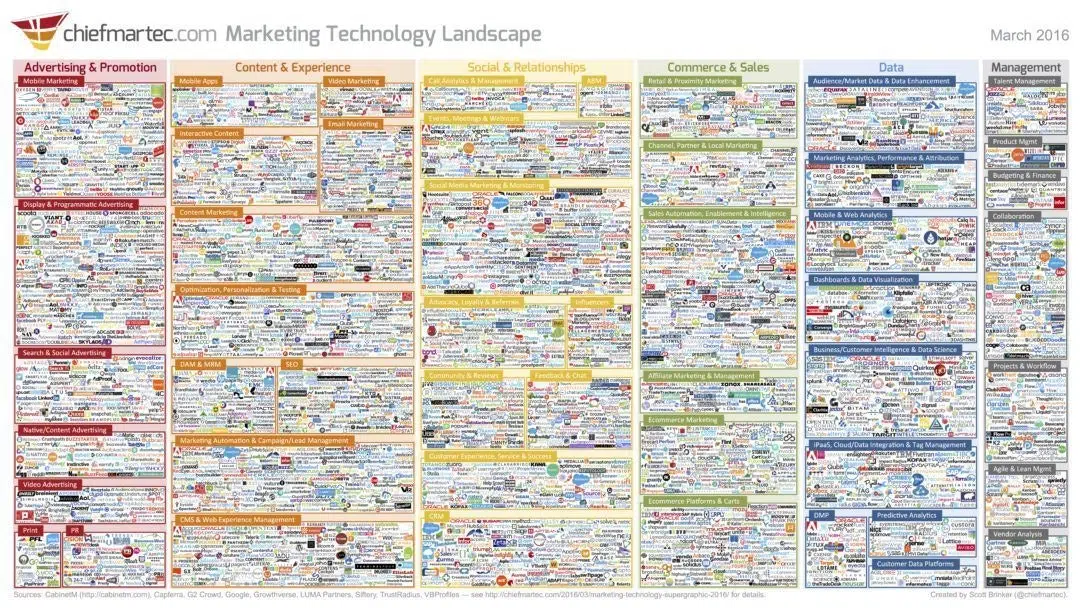As one of the foremost experts in marketing technology, Scott Brinker has chronicled the rise of martech solutions – and even he is amazed at the shifting landscape.
Four years ago, Brinker researched this landscape to satisfy his own curiosity. He found about 150 vendors selling different tools. By 2012, that number had doubled to 300. Last year, the number had grown to nearly 1,000. This year, Brinker found nearly 2,000 martech vendors filling every imaginable niche. (Since the original post, this number has now to doubled to almost 4,000 and counting).
Many marketers are overwhelmed by the sheer magnitude of all the different software categories in Brinker’s latest Marketing Technology Landscape Supergraphic. Some are terrified of creating a “frankenstack” in their organization – a shambling mishmash of marketing parts. While this fear is understandable, marketers are starting to get their heads around all the pieces that can fit together, Brinker said during his talk at our 2015 Go Inbound Marketing conference.
“This marketing tech landscape can be a bit distracting,” Brinker said. “What’s really happening is that marketing itself is changing fundamentally. But it’s really hard to quantify all these changes that are happening.”
Let’s dig deeper into how technology is transforming the way we, as marketers, broadcast our brand’s narratives and what you can do to bring technology into your own engagement with your audiences.
From Communications to Experiences
Traditionally, marketing was like The Secret Life of Walter Mitty: prospects would imagine what it would be like to be your customer. But today you actually get them engaged in your story – the way your website works, the flow of your social networks. Modern marketing is taking art-and-copy-based disciplines and augmenting them with new ways of thinking about code, logic, and data.
“We used to be in the business of communications and now we’re increasingly in the business of experiences,” Brinker said.
Brinker said he agrees with a statement by Ann Handley, Head of Content at MarketingProfs: “Technology is only as good as the story.” However, storytelling in a digital world also includes the software you buy, the configurations you set up, the algorithms and process design, the user experience design, he added.
“All of these things that we have historically thought of as geeky stuff is now getting woven into the narrative of storytelling,” Brinker said.
Software is Everywhere
In a digital world, software becomes the sense of our marketing efforts because analytics and data are how we see and interpret the actions of our audience, which in turn affects our strategic decisions about how we can reach them, Brinker said.
Your customers are also running software – their internet browser, phone apps, search engines and ad blocking software – although they make not think of it as software.
“Software is taking over the world,” Brinker said. “The challenge is: how do we manage that?”
Part of the problem is that our organizations don’t change at the breakneck pace of tech advancements. As a marketer, things are flying at you from all directions. Rapid feedback from customers, faster business cycle speeds, frequent disruptions and fragmented channels.
“How do we make this work?” Brinker said. “It’s hard. One of the few suggestions I can offer is we have to be very mindful about which choices we try to embrace.”
Traditionally, we think of developing a strategy first, and then selecting the technology to fulfill it (which is typically seen as better as buying first and figuring out the strategy later). But now it’s more like an ongoing loop.
“We really want to think of this as a circular relationship,” Brinker said. “Technology is evolving so rapidly that it is opening up new strategic possibilities for us.”
Part of the solution to figuring out the landscape complexity is to break down the old-school walls between the programming “geeks” and the marketing team. Thankfully, today we’re seeing some wonderful examples of hybrid marketers with broad skill sets that help to break through any barriers.
If You Sprint, Make it to the Finish
Brinker closed his talk by comparing how software companies pioneered waterfall and agile approaches to product design with similar approaches taken by marketers who are applying the agile methodology to their work, breaking initiatives down into small agile sprints, learning from what works, and iterating accordingly.
Some marketers fear that an agile approach would cause them to lose sight of the strategy, but that’s not really the case, Brinker said.
What’s really important to marketing teams working on agile projects is that they can focus on their objectives without being interrupted, Brinker said, because “fire drills are incredibly disruptive to what we do.”
How do you think about modern marketing? Do you use art-and-copy based disciplines while also considering the importance of code, logic and data? Is your company using the best software for your business? Are you making the most of your analytics and data so you can understand the actions of your audiences?





